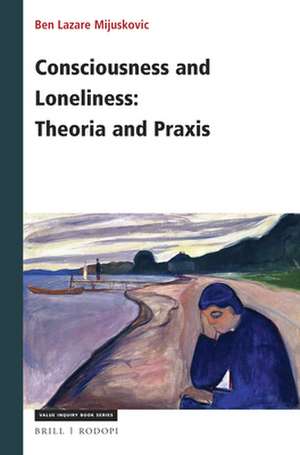Consciousness and Loneliness: Theoria and Praxis: Value Inquiry Book Series / Cognitive Science, cartea 327
Autor Ben Mijuskovicen Limba Engleză Paperback – 5 dec 2018
Preț: 633.95 lei
Preț vechi: 773.10 lei
-18% Nou
Puncte Express: 951
Preț estimativ în valută:
121.32€ • 126.19$ • 100.16£
121.32€ • 126.19$ • 100.16£
Carte indisponibilă temporar
Doresc să fiu notificat când acest titlu va fi disponibil:
Se trimite...
Preluare comenzi: 021 569.72.76
Specificații
ISBN-13: 9789004375642
ISBN-10: 9004375643
Pagini: 508
Dimensiuni: 155 x 235 x 25 mm
Greutate: 0.68 kg
Editura: Brill
Colecția Brill
Seria Value Inquiry Book Series / Cognitive Science
ISBN-10: 9004375643
Pagini: 508
Dimensiuni: 155 x 235 x 25 mm
Greutate: 0.68 kg
Editura: Brill
Colecția Brill
Seria Value Inquiry Book Series / Cognitive Science
Cuprins
Part 1
1 Introduction to the Simplicity Argument and its Relation to Previous Studies2 The Simplicity Argument: Meanings, Relations, and Space
3 The Simplicity Argument and the Freedom of Consciousness
4 The Simplicity Argument and Immanent Time-Consciousness
5 The Simplicity Argument and the Quality of Consciousness
6 Neuromania and Neo-Phrenology versus Consciousness
Part 2
7 The Simplicity Argument versus a Materialist Theory of MindPart 3
8 The Bicameral Mind, the Abyss, and Underworlds9 Loneliness: In Harm’s Way
10 Metaphysical Dualism, Subjective Idealism, and Existentialism
By Way of an Epilogue
Bibliography
Index
Notă biografică
Ben Mijuskovic, Ph.D (University of California, San Diego), is a tenured Associate Professor, and teaches at California State University. He is a licensed Clinical Therapist and author of 4 books and 60 articles.
Recenzii
"Mijuskovic possesses the unique combination of academic, clinical, and professional experience to cross the aisle between philosophers and therapists.[...] Philosophers of mind, psychologists and clinical psychiatrists should all consider Mijuskovic’s thesis in its unique combination of metaphysical dualism and existentialist psychology." - Michael D. Bobo (Norco College), in: Philosophy in Review 40:1 (2020).
"Building on his prior work, Mijuscovic utilizes an interdisciplinary approach to present a metaphysical subjective dualism in favor of a “substantive theory of the self and the innate quality of loneliness” (Mijuscovic, 2019, p.3)." - Joshua Marcus Cragle (University of Amsterdam), in: Journal of Thought (Fall 2019).
"The thesis of Mijuskovic’s study is that the central motive of human conduct is the fear of aloneness. ... His argument develops in a surprising and improbable direction: Whereas most thinkers have regarded loneliness as a secondary and derived condition, stemming from the interruption of an original union with others, he feels that the ultimate and primordial human state is that of being alone and that relatedness to others is the secondary formation. ... I would suggest that by locating loneliness in the heart of universal human nature, he has transformed the feeling of alienated solitude into the most deeply shared of all human experience." - George E. Atwood, “All Men Are Together in Their Loneliness,” in: Contemporary Psychology
"The book is undoubtedly the best treatment of loneliness from the philosophical perspective and is likely to remain so for a long time. Furthermore, the philosophical perspective, at this time and possibly for the indefinite future, may offer the most understanding (versus “explanation”) of the subject. Professor Mijuskovic has ably defended his thesis that man’s loneliness is made possible by the reflexive nature of consciousness. He illustrates, through numerous philosophical arguments and literary examples, that man’s aloneness is the primary truth of human existence. The work is contemporary in its ‘in touchness’ with man’s predicament but at the same time demolishes the trite and falsely comforting contention that loneliness is a problem of recent civilization. It is rich enough in reference material to serve as an excellent resource for any student of man." - Joseph Hartog, editor of the Anatomy of Loneliness
"Building on his prior work, Mijuscovic utilizes an interdisciplinary approach to present a metaphysical subjective dualism in favor of a “substantive theory of the self and the innate quality of loneliness” (Mijuscovic, 2019, p.3)." - Joshua Marcus Cragle (University of Amsterdam), in: Journal of Thought (Fall 2019).
"The thesis of Mijuskovic’s study is that the central motive of human conduct is the fear of aloneness. ... His argument develops in a surprising and improbable direction: Whereas most thinkers have regarded loneliness as a secondary and derived condition, stemming from the interruption of an original union with others, he feels that the ultimate and primordial human state is that of being alone and that relatedness to others is the secondary formation. ... I would suggest that by locating loneliness in the heart of universal human nature, he has transformed the feeling of alienated solitude into the most deeply shared of all human experience." - George E. Atwood, “All Men Are Together in Their Loneliness,” in: Contemporary Psychology
"The book is undoubtedly the best treatment of loneliness from the philosophical perspective and is likely to remain so for a long time. Furthermore, the philosophical perspective, at this time and possibly for the indefinite future, may offer the most understanding (versus “explanation”) of the subject. Professor Mijuskovic has ably defended his thesis that man’s loneliness is made possible by the reflexive nature of consciousness. He illustrates, through numerous philosophical arguments and literary examples, that man’s aloneness is the primary truth of human existence. The work is contemporary in its ‘in touchness’ with man’s predicament but at the same time demolishes the trite and falsely comforting contention that loneliness is a problem of recent civilization. It is rich enough in reference material to serve as an excellent resource for any student of man." - Joseph Hartog, editor of the Anatomy of Loneliness










